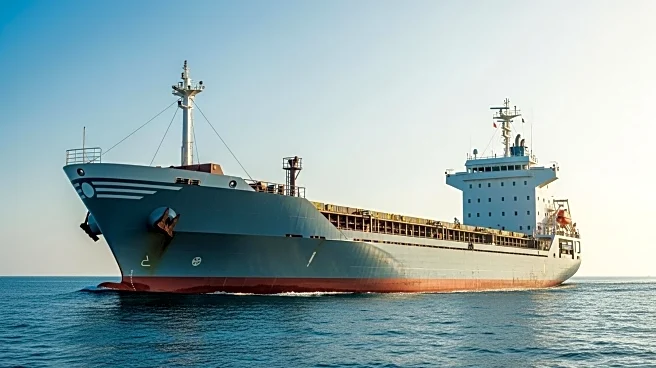What's Happening?
Prime Minister Narendra Modi inaugurated and laid the foundation stone for projects valued at Rs 34,200 crore in Bhavnagar, Gujarat. During the event, PM Modi emphasized the importance of India's ports in establishing the nation as a global maritime powerhouse. He highlighted the government's decision to recognize large ships as infrastructure, aiming to bolster the maritime sector. Modi pointed out that India spends Rs 6 lakh crore annually on foreign shipping services, a figure comparable to the defense budget. He noted that 50 years ago, 40% of India's trade was conducted via India-made ships, a number that has now dwindled to 5%. Modi criticized past policies, such as the license raj, for stifling Indian talent and stressed the need for self-reliance, stating that dependence on other countries is India's main adversary.
Why It's Important?
The inauguration of these projects marks a significant step towards enhancing India's maritime capabilities and reducing reliance on foreign shipping services. By advocating for self-reliance, PM Modi aims to stimulate domestic production and innovation in the shipping sector, potentially leading to economic growth and job creation. This move could also strengthen India's position in global trade, as increased domestic shipping capacity may lower costs and improve efficiency. The emphasis on self-reliance aligns with broader national goals of economic independence and resilience, which could have long-term benefits for various industries and the overall economy.
What's Next?
Following the inauguration, the focus will likely shift to the implementation and development of these projects. Stakeholders in the maritime industry may respond with increased investment and innovation to capitalize on the government's push for self-reliance. Additionally, there may be policy adjustments to further support domestic shipping and infrastructure development. The government might also explore partnerships with private entities to expedite project completion and enhance technological capabilities. As these projects progress, monitoring their impact on trade dynamics and economic indicators will be crucial.
Beyond the Headlines
The push for self-reliance in the shipping sector could have broader implications for India's industrial policy and international relations. By reducing dependency on foreign services, India may strengthen its negotiating position in trade agreements and foster a more robust domestic market. This initiative could also inspire similar self-reliance efforts in other sectors, promoting a culture of innovation and entrepreneurship. Ethically, the focus on domestic production may raise questions about environmental sustainability and labor practices, necessitating careful consideration of these aspects as projects develop.









